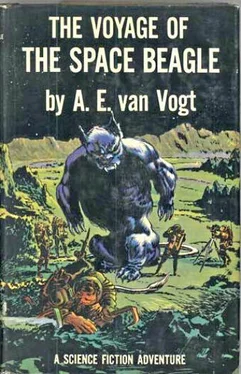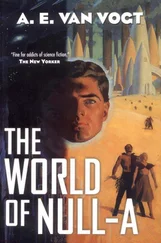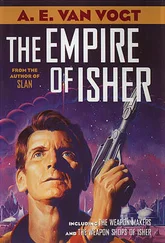Grosvenor said quietly, “I wouldn’t try it, Kent. I’m warning you.”
The man either did not hear him or was too angry to pay any attention. The tracer beam dazzled Grosvenor’s eyes. There was a hiss and a crackle, and a cry of pain from Kent. The light blinked out. Grosvenor saw that Kent was trying to shake the weapon from his hand. It clung stickily, but finally dropped to the floor with a metallic clatter. In evident agony, Kent grabbed his injured hand and stood there swaying.
Grosvenor said with a kind of angry sympathy, “Why didn’t you listen? These wall plates are carrying a high electric potential, and since a vibrator ionizes the air, you got an electric shock that simultaneously nullified the energy you discharged, except near the muzzle. I hope it didn’t burn you too badly.”
Kent had control of himself. He was white and tense, but calm. “This will cost you dearly,” he said in a low voice. “When the others find out that one man is trying to force his ideas—” He broke off and gestured imperiously to his two henchmen. “Come along, we’re through here for the time being.”
Fully eight minutes after they had gone, Fander came in. It was necessary for Grosvenor to explain patiently several times that he was no longer sick. And it required even longer to persuade Dr. Eggert, whom the young man summoned. Grosvenor did not worry about being found out. It would take a definite suspicion plus considerable research to identify the drug he had used.
In the end, they left him alone, with the advice that he remain in his quarters for a day or so. Grosvenor assured them that he would follow their instructions, and he meant it. In the hard days ahead, the Nexial department would be his fortress. He didn’t know just what might be done against him, but here he was as ready as he could be.
About an hour after the doctors had departed, there was a click in the mail-delivery chute. It was from Kent, an announcement of a meeting called, according to the wording, at the request of Elliott Grosvenor. It quoted from Grosvenor’s first letter to Kent, and ignored all subsequent events. The printed form ended: “In view of Mr. Grosvenor’s past performances, the Acting Director feels that he is entitled to a hearing.”
At the bottom of Grosvenor’s notice, Kent had written in longhand: “Dear Mr. Grosvenor: In view of your illness, I have instructed Mr. Gourlay’s staff to connect your communicator with the control-room auditorium, so that you may participate from your sickbed. The meeting will otherwise be private.”
At the designated hour, Grosvenor tuned into the control room. As the image came on, he saw that the whole room was spread before him in sharp focus, and that the receiving plate must be the large communicator just above the massive control board. At this moment, his face was a ten-foot image looking down at the men. For once, he realized wryly, he was going to be present at a meeting in a conspicuous way.
A quick glance over the room showed that most of the department heads were already seated. Directly below the receiving plate, Kent was talking to Captain Leeth. It must have been the end, not the beginning of a conversation, because he looked up at Grosvenor, smiled grimly, and then turned to face his small audience, Grosvenor saw that he wore a bandage on his left hand.
“Gentlemen,” said Kent, “without further preamble I am going to call on Mr. Grosvenor.” Once more he looked up at the communicator plate, and the same savage smile was on his face. He said, “Mr. Grosvenor, you may proceed.”
Grosvenor began, “Gentlemen, about a week ago, I had enough evidence to justify this ship’s taking action against the alien intelligence of this galaxy. That may seem like a tremendous statement, and it is an unfortunate fact that I can merely give you my interpretation of the available evidence. I cannot prove to everybody present that such a being does actually exist. Some of you will realize that my reasoning is sound. Others, lacking knowledge of certain sciences, will feel that the conclusions are distinctly controversial. I have racked my brain over the problem of how to convince you that my solution is the only safe one. Telling you what experiments I made happens to be one of the steps which it seemed reasonable to take.”
He made no mention of the fact that he had already had to evolve an elaborate ruse in order to obtain a hearing at all. In spite of what had happened, he had no desire to antagonize Kent any more than was necessary.
He continued, “I now want to call on Mr. Gourlay. I am sure you will not be too surprised when I tell you that all this goes back to automatic C-9. I wonder if you would tell your colleagues about it.”
The communications chief looked at Kent, who shrugged and nodded. Gourlay hesitated, then said, “Its impossible to say just when C-9 came on. For the benefit of those who are feeling ignorant right now, C-9 is a minor screen that is activated automatically when the dust in the surrounding space reaches a density that could be dangerous to a ship on the move. The apparent density of the dust in any given volume of space is of course relatively greater at high velocities than at low. The fact that there was enough dust around to affect C-9 was first noticed by a member of my staff shortly before those lizards were precipitated into the control room.”
Gourlay leaned back in his seat. “That’s it,” he said.
Grosvenor said, “Mr. von Grossen, what did your department find out about the space dust in this galaxy?”
The bulky von Grossen shifted in his chair. He said without getting up, “There’s nothing about it that we could regard as being characteristic or unusual. It’s a little denser than that in our own galaxy. We collected a small amount of the dust by means of ionizing plates with a very high potential, and scraped off the deposits. It was mostly solid, a few simple elements being present and traces of many compounds — which could have been formed at the moment of condensation — and a little free gas, mostly hydrogen. Now, the trouble is that what we got probably bears very little resemblance to the dust as it exists outside, but the problem of collecting it in its original form has never been satisfactorily solved. The very process used in capturing it causes it to change in many ways. We can never more than guess at how it functions in space.” The physicist lifted his hands helplessly. “That’s all I can say now.”
Grosvenor continued. “I could go on asking various department heads what they found out. But I believe I can summarize their discoveries without doing anyone an injustice. Both Mr. Smith’s and Mr. Kent’s departments ran into much the same problem as did Mr. von Grossen’s. I believe that Mr. Smith by various means saturated the atmosphere of a cage with the dust. The animals he put into the cage showed no ill effects, so he finally tested it on himself. Mr. Smith, have you anything to add to that?”
Smith shook his head. “If it’s a life form, you can’t prove it by me. I admit that the closest we got to getting the real stuff was when we went out in a lifeboat, opened all the doors, then closed them, and let air into the boat again. There were slight changes in the chemical content of the air, but nothing important.”
Grosvenor said, “So much for the factual data. I also, among other things, performed the experiment of taking out the lifeboat and letting the space dust drift in through open doors. What I was interested in was: If it’s life, what does it feed on? So after I had pumped the air back into my lifeboat, I analysed it. Then I killed a couple of small animals, and again analysed the atmosphere. I sent samples of the atmosphere as it was before and after to Mr. Kent, Mr. von Grossen, and Mr. Smith. There were several very minute chemical changes. They could be attributed to analytical error. But I should like to ask Mr. von Grossen to tell you what he found.”
Читать дальше











